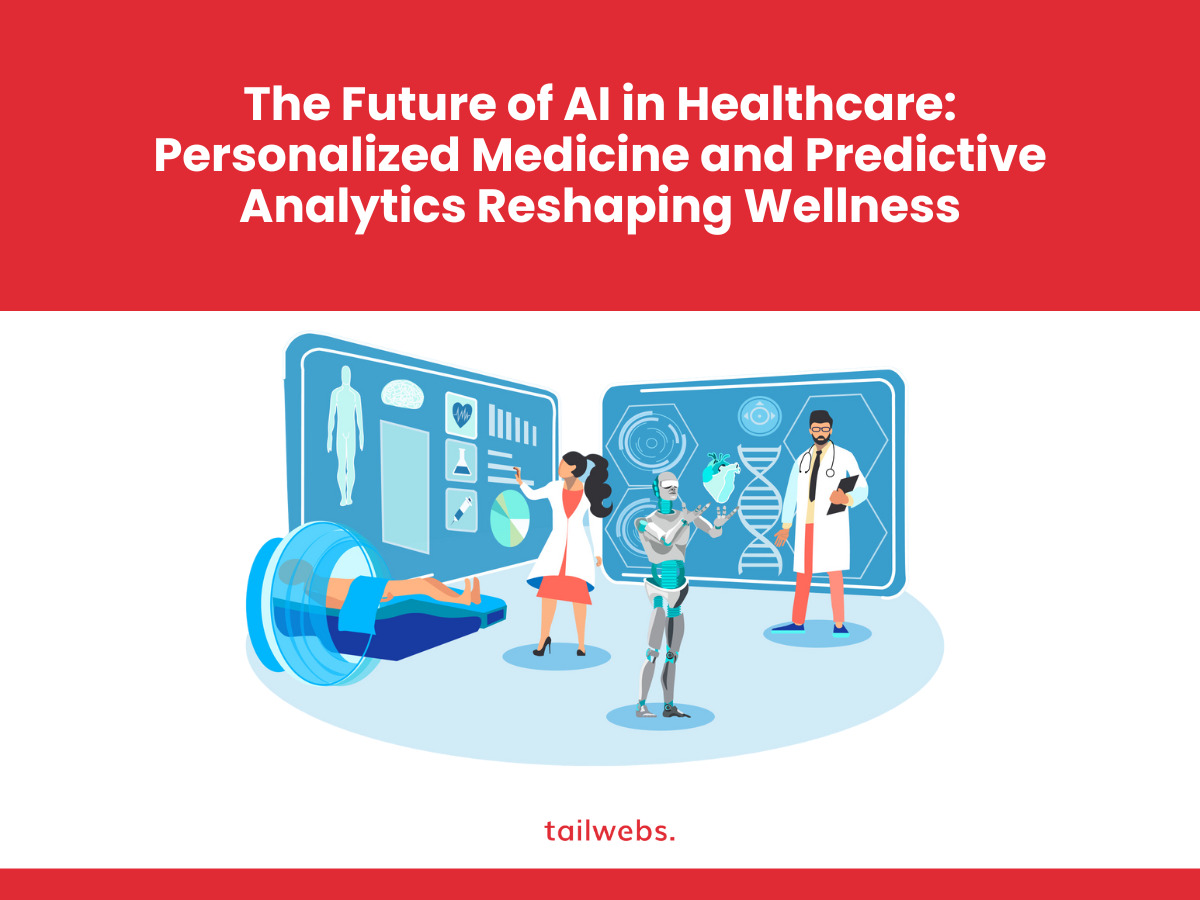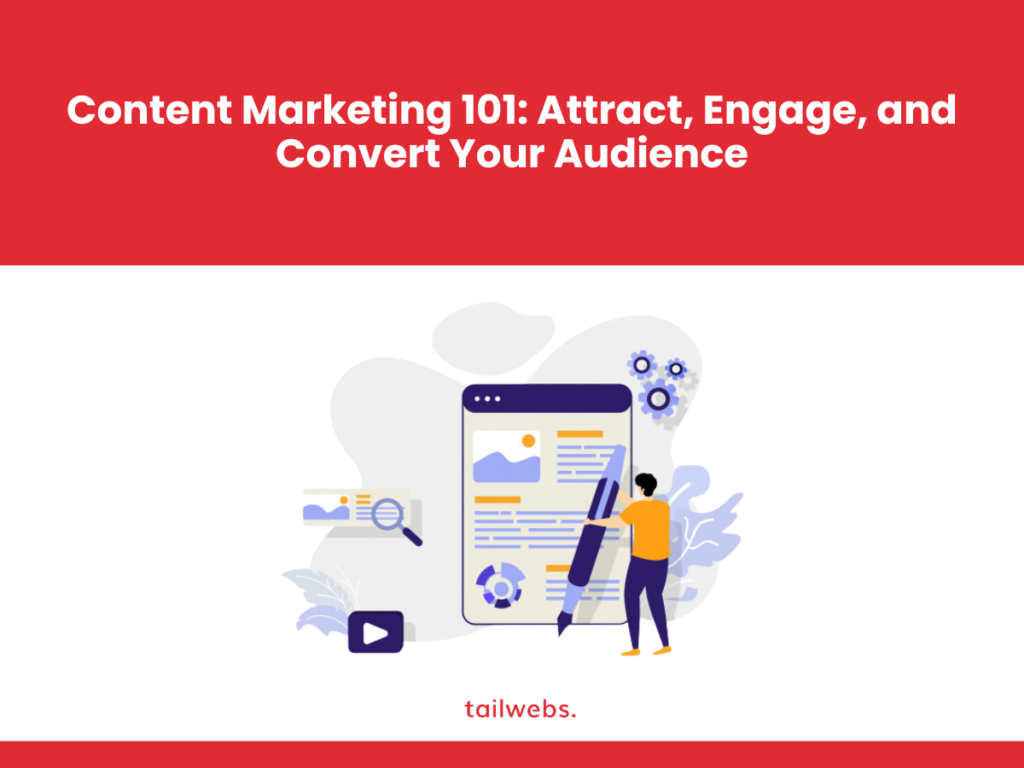Imagine a world where healthcare isn’t a one-size-fits-all approach, but a personalised journey fueled by artificial intelligence (AI). Where disease is predicted before it strikes, treatments are tailored to your unique DNA, and preventative measures are guided by your individual health profile. This is not the stuff of science fiction, it’s the future of healthcare powered by AI, personalised medicine, and predictive analytics.
Why AI is Revolutionising Healthcare:
Precision Medicine:
AI analyses vast amounts of genomic and medical data to identify genetic markers and patterns that predict disease risk and response to treatments. This allows for tailoring therapies to individual needs and maximising their efficacy.
Early Disease Detection:
AI algorithms can analyse medical images, scans, and patient data to detect diseases at their earliest stages, before symptoms even appear. This early intervention leads to better outcomes and reduces the burden of chronic illnesses.
Predictive Analytics:
AI models can identify trends and patterns in healthcare data to predict future health events, such as hospital readmission or the onset of chronic conditions. This allows for proactive interventions and preventative measures.
Data-Driven Insights:
AI helps extract valuable insights from the massive volume of healthcare data, enabling researchers and clinicians to make better decisions about treatment plans, resource allocation, and public health strategies.
The Stats Paint a Compelling Picture:
The global AI in healthcare market is expected to reach $64.1 billion by 2028. (Statista, 2023)
75% of healthcare professionals believe AI will revolutionise healthcare within the next five years. (Accenture, 2023)
AI-powered tools can improve early disease detection by up to 20%. (McKinsey & Company, 2023)
Personalised medicine can reduce healthcare costs by up to 30%. (PwC, 2023)
Personalised Medicine: Tailoring Treatments to Your DNA:
Imagine a world where your genes hold the key to unlocking your optimal health. AI-powered tools are paving the way for personalised medicine, where treatment plans are based on your unique genetic makeup and health history. This can include:
Targeted cancer therapies:
AI helps identify the specific genetic mutations driving a patient’s cancer, allowing for targeted therapies with fewer side effects.
Personalised drug dosing:
AI analyses individual factors like genetics and metabolism to predict how a patient will respond to a medication, ensuring optimal dosage and minimising adverse reactions.
Preventative measures based on genetic risk:
AI can identify individuals with a higher genetic risk for certain diseases, enabling them to take preventative measures like lifestyle modifications or early screening.
Predictive Analytics: Preventing Illness Before it Starts:
Imagine a health system that anticipates your needs before you even feel unwell. AI-powered predictive analytics are making this a reality:
Early disease detection:
AI algorithms analyse medical images and scans to identify subtle signs of disease, like precancerous lesions or early-stage tumours, enabling early intervention and treatment.
Predicting hospital readmissions:
AI models analyse patient data to identify individuals at high risk of being readmitted to the hospital, allowing for proactive interventions and care management.
Managing chronic conditions:
AI can predict flares and complications in chronic conditions like diabetes or heart disease, allowing for closer monitoring and preventative measures.
Challenges and Ethical Considerations:
While AI holds immense promise for healthcare, it’s crucial to address potential challenges and ethical considerations:
Data privacy and security:
Protecting sensitive medical data is paramount. Robust data security measures and clear data governance policies are essential.
Algorithmic bias:
AI algorithms are only as good as the data they are trained on. Biases in data can lead to discriminatory outcomes, requiring careful data curation and bias mitigation strategies.
Accessibility and equity:
Ensuring equitable access to AI-powered healthcare for all populations is crucial. Bridging the digital divide and addressing affordability concerns are key challenges.
Human-AI collaboration:
AI is a powerful tool, but it should not replace human expertise. Fostering collaboration between AI and healthcare professionals is essential for optimal patient care.
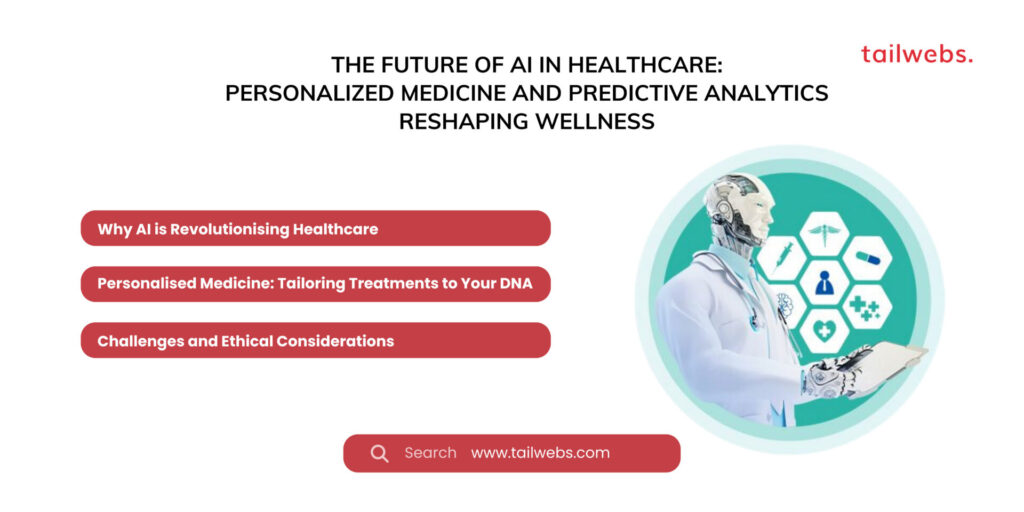
Conclusion: A Future of Personalized Wellness Powered by AI
The future of healthcare is not just about treating illness, but about preventing it and optimising individual well-being. By embracing AI, personalised medicine, and predictive analytics, we can unlock a future of:
Proactive healthcare:
Illness detected before it starts, treatments tailored to your unique needs, and preventative measures guiding your journey to optimal health.
Empowered patients:
Individuals actively engaged in their health, equipped with data-driven insights to make informed decisions about their well-being.
A healthier society:
Reduced healthcare costs, improved disease management, and Embracing the Ethical Imperative
The revolution AI brings to healthcare carries tremendous responsibility. Ensuring equitable access and ethical implementation is crucial to creating a future where all benefit from these advancements. Here are some key actions needed:
Investing in digital infrastructure and equitable access:
Bridging the digital divide and ensuring access to AI-powered healthcare regardless of socioeconomic background is vital. This requires targeted investments in infrastructure, training, and education.
Addressing affordability concerns:
Ensuring AI-powered healthcare is affordable and accessible to all requires innovative financing models and collaboration between public and private sectors.
Developing robust data privacy and security measures:
Protecting patient data is paramount. Implementing strong data security measures, clear data governance policies, and transparency about data use are essential.
Mitigating algorithmic bias and discrimination:
Biassed data can lead to unfair outcomes. Careful data curation, algorithmic audits, and diverse development teams are crucial to addressing bias and ensuring AI serves all without discrimination.
Fostering human-AI collaboration:
AI is a powerful tool, but it cannot replace human expertise and compassion. Cultivating trust and collaboration between AI and healthcare professionals ensures optimal patient care and prevents overreliance on algorithms.
Promoting public awareness and engagement:
Open communication about AI in healthcare, its benefits and risks, and its ethical implications is crucial for building trust and encouraging public acceptance.
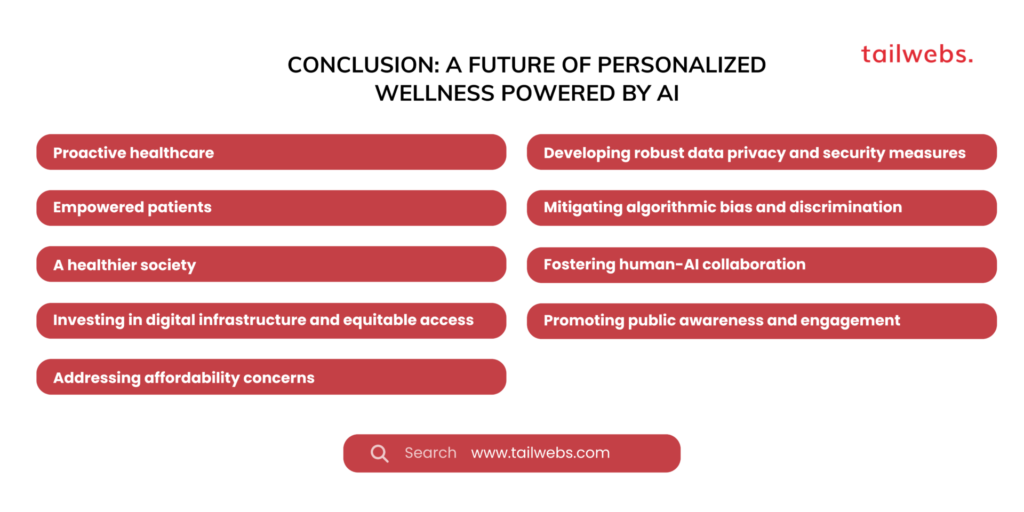
The Road Ahead: Embracing the AI-Powered Healthcare Revolution
The future of healthcare lies not in a single technology but in a synergy of AI, human expertise, and ethical considerations. By embracing this collaborative approach, we can navigate the challenges, leverage the immense potential of AI, and build a future where personalised medicine and predictive analytics empower individuals, optimise wellness, and create a healthier world for all.
Imagine a world where your health journey is uniquely yours, guided by insights from your own DNA and data, where disease is caught before it takes hold, and where prevention takes centre stage. This is the future AI-powered healthcare can offer, and it’s a future we must shape with responsibility, equity, and ethical leadership at the forefront.
Join the Movement: Advocate for a Future of Ethical AI in Healthcare
We all have a role to play in ensuring AI in healthcare is developed and implemented ethically. This can include:
Educating yourself:
Learn about AI in healthcare, its potential benefits and challenges, and its ethical implications.
Demanding transparency and accountability:
Ask questions about how AI is being used in healthcare, raise concerns about potential biases, and advocate for responsible development and deployment.
Supporting organisations working on ethical AI in healthcare:
Donate your time, skills, or resources to organisations promoting ethical AI development and implementation.
By engaging in open dialogue, demanding ethical practices, and advocating for equitable access, we can collectively shape a future where AI in healthcare empowers individuals, improves lives, and contributes to a healthier and more equitable world.
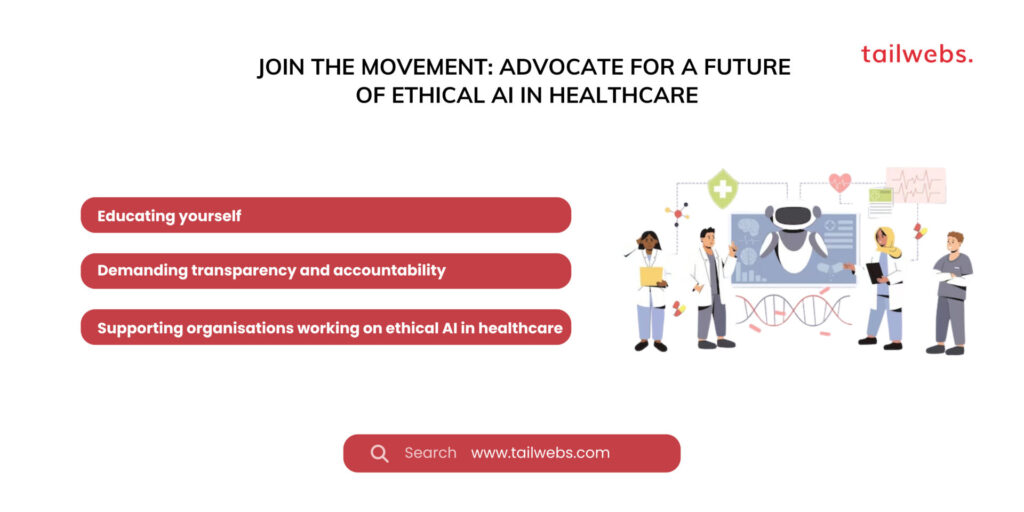
Conclusion:
This continuation of the blog delves into the challenges and ethical considerations of AI in healthcare, emphasises the importance of equitable access and ethical implementation and provides actionable steps for readers to get involved in advocating for a responsible future of AI-powered healthcare. It concludes with a call to action, urging readers to play their part in shaping this ethically-driven healthcare revolution.
